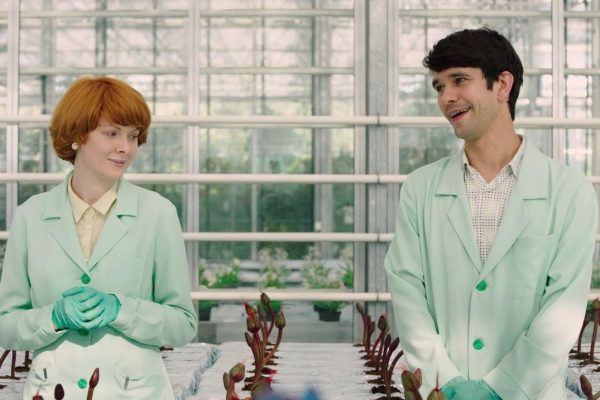In a time when fully engaging with anything beyond our own four walls feels like it requires a suit of armour and a cynicism dial cranked up to eleven, the idea of a flower that squirts happiness like a Glade Plug-In filled with dopamine seems like a good one. However, what if the trade-off is our sense of self, as teetering and tortuous as that may be? Austrian director Jessica Hausner (Lourdes, Amour Fou) plays with this idea, along with themes of maternal guilt, neglect, and the ethics of genetic engineering, in a fascinating but aloof chiller that updates ideas from Invasion of the Body Snatchers, Brave New World, and the paranoiac fiction of Ira Levin to the pharmaceutical present.
Alice Woodard (Emily Beecham) is a senior plant breeder at biotech company who is working on a new strain of flower that releases oxytocin, the ‘mother hormone’, designed to induce a sense of well-being. She names it ‘Little Joe’ after her own son. Despite engineering the flowers to be sterile, she becomes suspicious that Little Joe (which resembles a punky neon thistle) may be manipulating those around to her to get them out into the wider world and propagate their effects, which include a creepy difference in behaviour that may indicate those exposed to Little Joe are no longer themselves.
Beecham’s brittle, uptight performance (for which she was awarded Best Actress at Cannes) is disquieting in its own right. Dressed like an Edwardian governess who’s been transported to modern England and left to wander through Top Shop, Alice gives the impression that she’s managed to procreate through some kind of spontaneous cellular division instead of the usual method. Even her leisure wear is zipped up to the neck, like a barrier against any genuine human contact. It’s no surprise given her lack of warmth, and the complex feelings she has about motherhood she conveys to her therapist, that she engineers Little Joe to require a high level of the attention we would categorise as being maternal. This makes her initial resistance to the idea that things are going badly wrong all the more believable. She’s also enabled by her lovelorn assistant Ben Whishaw, who’s more Uriah Heep than Paddington here.
There’s an abstract, dispassionate coldness in the style of Little Joe that stops it from getting fully under the skin however. The Kubrickian qualities of the symmetrical framing and the slow, surgically curious camerawork have been noted by several commentators, and the film could work as a companion piece to Birth, another ambiguous tale of maternal anxiety directed by Jonathan Glazer; also a filmmaker many have posited as a potential inheritor of Kubrick’s mantle. There’s the sense that Hausner, like Alice, is keeping the viewer at arm’s length, and it’s this style that stops us from fully connecting with the horrific implications of the story. The scenes where Alice visits her therapist are also guilty of putting the themes across a little bluntly, when they’re admirably explored elsewhere in the narrative. It’s also never fully convincing that a character as literally buttoned-up as Alice would be in therapy in the first place.
Despite that narrative convenience, and the overall chilliness, Little Joe is distinctive, intelligent and beautiful enough to be a qualified success. Hausner has achieved a difficult feat in referencing many different sources while feeling fresh and original. If you like the tone and intentional flatness of Yorgos Lanthimos‘ more outlandish ideas-driven films, there will be much to enjoy here. It could also serve as a great stepping stone into the horror genre for younger viewers. There is little graphic, or even particularly adult, depicted on screen. All the chills are provided by the ideas, which could have resonance for those whose identities are still being moulded.
@Filmhouse, Edinburgh from Fri 21 Feb 2020
